

Climate change and health. Climate change Over the last 50 years, human activities – particularly the burning of fossil fuels – have released sufficient quantities of carbon dioxide and other greenhouse gases to trap additional heat in the lower atmosphere and affect the global climate. In the last 130 years, the world has warmed by approximately 0.85oC. Each of the last 3 decades has been successively warmer than any preceding decade since 1850(1). Sea levels are rising, glaciers are melting and precipitation patterns are changing. Extreme weather events are becoming more intense and frequent. What is the impact of climate change on health? Although global warming may bring some localized benefits, such as fewer winter deaths in temperate climates and increased food production in certain areas, the overall health effects of a changing climate are overwhelmingly negative. Extreme heat Pollen and other aeroallergen levels are also higher in extreme heat.
Climate change and health. Climate change and mental health: risks, impacts and priority actions. Planet Watch: Climate change and disease. Dr Willow Hallgren As we find ourselves in the midst of a one-in-100-year global pandemic, now is the time to reflect on the way in which human activities help bring about the creation of new diseases and the spread of existing diseases.
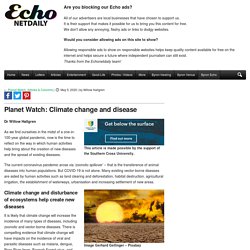
The current coronavirus pandemic arose via ‘zoonotic spillover’ – that is the transference of animal diseases into human populations. But COVID-19 is not alone. Effects of climate change on human health. The effects of global warming include its effects on human health.[3][4] The observed and projected increased frequency and severity of climate related impacts will further exacerbate the effects on human health.[5][6] This article describes some of those effects on individuals and populations.
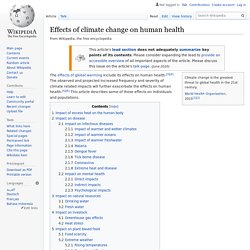
Impact of excess heat on the human body[edit] The human body requires evaporative cooling to prevent overheating, even with a low activity level. With excessive ambient heat and humidity, adequate evaporative cooling does not take place. Human thermoregulatory capacity is exceeded. A sustained wet-bulb temperature or Wet-bulb globe temperature exceeding about 35 °C (95 °F) can be fatal.[7][8] Human response to heat stress can be hyperthermia, heat stroke and other harmful effects.
The land enriches the soul: On climatic and environmental change, affect, and emotional health and well-being in Rigolet, Nunatsiavut, Canada. For Canada’s Inuit populations, the landscapes surrounding communities, and practices such as hunting, fishing, trapping, foraging, and travelling to cabins, contribute greatly to human health and well-being.

Climatic and environmental change, however, are altering local ecosystems, and it is becoming increasingly challenging for many Inuit to continue to travel or hunt on the land. These changes greatly impact health and well-being. While numerous studies examine the physical health impacts of climate change, few consider the affective implications of these changes, and the subsequent impacts on the emotional well-being of Inuit populations.
From data gathered through a multi-year, community-driven project in Rigolet, Nunatsiavut, Labrador, Canada, however, it is evident that the emotional consequences of climate change are extremely important to Northern residents. APA: Climate Change's Toll on Mental Health. WASHINGTON — When people think about climate change, they probably think first about its effects on the environment, and possibly on their physical health.
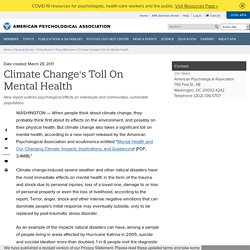
But climate change also takes a significant toll on mental health, according to a new report released by the American Psychological Association and ecoAmerica entitled "Mental Health and Our Changing Climate: Impacts, Implications, and Guidance (PDF, 3.4MB). " Climate change-induced severe weather and other natural disasters have the most immediate effects on mental health in the form of the trauma and shock due to personal injuries, loss of a loved one, damage to or loss of personal property or even the loss of livelihood, according to the report. Ecological grief as a mental health response to climate change-related loss.
1.Ceballos, G., Ehrlich, P.
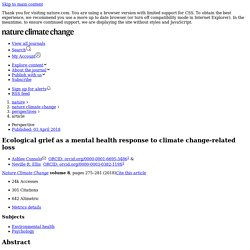
R. & Dirzo, R. Biological annihilation via the ongoing sixth mass extinction signaled by vertebrate population losses and declines. Proc. Natl Acad. Climate Change Health Check 2020. Facts on Health and the Environment. The Lancet: Health & climate change policy. To view the full text, please login as a subscribed user or purchase a subscription.
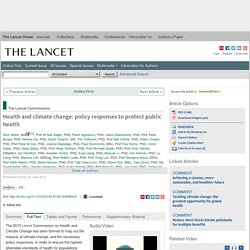
Click here to view the full text on ScienceDirect. Figure 1 An overview of the links between greenhouse gas emissions, climate change, and health. The Lancet: Safeguarding human health in the Anthropocene epoch. B144 15 en. Global Center on Adaptation. Deadly by the Dozen: 12 Diseases Climate Change May Worsen. Bird flu, cholera, Ebola, plague and tuberculosis are just a few of the diseases likely to spread and get worse as a result of climate change, according to a report released yesterday by the Wildlife Conservation Society (WCS).
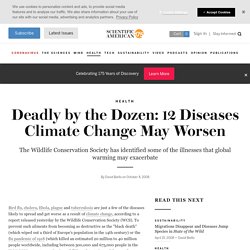
To prevent such ailments from becoming as destructive as the "black death" (which wiped out a third of Europe's population in the 14th century) or the flu pandemic of 1918 (which killed an estimated 20 million to 40 million people worldwide, including between 500,000 and 675,000 people in the U.S.), WCS suggests monitoring wildlife to detect signs of these pathogens before a major outbreak. "We will see a shift in the geographic distribution of diseases, with certain areas having reduced prevalence and other areas increasing," says veterinarian William Karesh, WCS's vice president of global health programs. 10 ways to protect our health and the environment. Sustainability in Healthcare - health.vic. Victorian Memorandum for Health and Nature. Club of Rome. Above the Fold. PowerPoints Public Health in the Anthropocene. Younger generation fail to notice environmental decline due to generational amnesia risking conservation longevity - British Ecological Society.
Young people are not as aware of environmental changes compared to the older generation, according to a new report published in People and Nature, by Royal Holloway, University of London and international conservation charity ZSL (Zoological Society London) due to a phenomenon known as Shifting Baseline Syndrome (SBS).
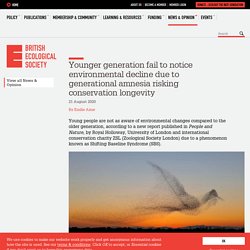
The UK-based paper showcases a reduced awareness of issues such as the decline in bird biodiversity and abundance within their area compared to several years ago – meaning vital naturalist knowledge is being lost over generations without people noticing. The Human–Nature Relationship and Its Impact on Health: A Critical Review. Sustainable healthcare / Knut Schroeder ... [et al.] Human Ecology - Examples of Ecologically Sustainable Development. Environmental success stories from around the world with their lessons on how to turn from decline to restoration and sustainability. ecotippingpoints.org Author: Gerald G.
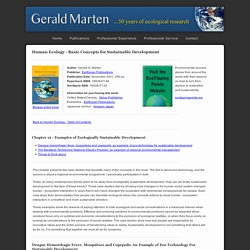
MartenPublisher: Earthscan PublicationsPublication Date: November 2001, 256 pp.Paperback ISBN: 1853837148Hardback SBN: 185383713X Information for purchasing this book: United States/Canada - Stylus Publishing Elsewhere - Earthscan Publications Japanese version - Amazon Japan Back to Human Ecology - Table of Contents Chapter 12 - Examples of Ecologically Sustainable Development This chapter presents two case studies that illustrate many of the concepts in this book. Today, so many contemporary trends seem to be away from ecologically sustainable development. These examples show the rewards of paying attention to both ecological and social considerations in a balanced manner when dealing with environmental problems.
Global Green and Healthy Hospitals. GGHH Agenda and its Sustainability Goals. National Strategy for Ecologically Sustainable Development - Part 1 Introduction. Prepared by the Ecologically Sustainable Development Steering Committee Endorsed by the Council of Australian Governments December, 1992 ISBN 0 644 27253 8 Part 1 - Introduction Index to Part 1 What is ecologically sustainable development?
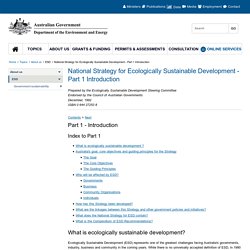
Ecologically Sustainable Development (ESD) represents one of the greatest challenges facing Australia's governments, industry, business and community in the coming years. While there is no universally accepted definition of ESD, in 1990 the Commonwealth Government suggested the following definition for ESD in Australia: India to generate 775.5 tonnes of medical waste daily by 2020: Study. India is likely to generate about 775.5 tonnes of medical waste per day by 2022 from the current level of 550.9 tonnes daily, a study conducted jointly by industry body ASSOCHAM and Velocity has said.
The study, which was released yesterday, said medical waste is expected to grow at a compounded annual growth rate (CAGR) of about 7 per cent. Health Nature and Sustainability Research Group. This study used a mixed methods approach, consisting of an online survey and interviews, to investigate the opportunities and barriers for developing a community garden on Deakin University’s Burwood Campus. An online survey of staff and student across the Burwood campus was conducted and 532 staff and students replied to our survey –84% thought it would be a great idea.
Much support was also shown for a range of other health and sustainable food activities that could be implemented in the community garden. Activities which demonstrated the most potential included: using the garden to reduce food miles; the use of the garden for rest and relaxation; to connect with nature; and buying garden produce at farmer’s markets on campus.
The interviews, with Key Informants, uncovered 7 enablers to establishing and maintaining a community garden, and also barriers, which could be summarised by 4 key themes: Design and Location, Funding, Governance Processes and University Policies. Deakin Explore. Climate change campaigner. Deakin Explore. 43291 sendaiframeworkfordrren. Welcome to the Global Assessment Report. About UN DRR. Special Issue : Disasters and Their Consequences for Public Health. Special Issue Editor Dr. Kimberley ShoafWebsiteGuest Editor. Special Issue : Disaster Mental Health Risk Reduction. Special Issue Editors Dr. Lennart ReifelsWebsiteGuest Editor. World Meteorological Organization. Royal Commission into National Natural Disaster Arrangements. WHO Manifesto for a healthy recovery from COVID-19. Independent evaluation of global COVID-19 response announced. ASSESSING THE ENVIRONMENTAL CONSEQUENCE OF POTENTIAL MAJOR ACCIDENTS.
Iodine Global Network (IGN) - Home. Why Disaster Preparedness Cannot Wait. As countries emerge from the COVID-19 pandemic over the coming year, world leaders will face a defining moment. By ramping up investments in disaster preparedness, they can shape their legacies and set humanity on a safer course for the next decade and beyond. GENEVA/WASHINGTON, DC – The world has been planning for the future in the mistaken belief that it will resemble the past.
But as COVID-19 coincides with cyclones in South Asia and the Pacific and vast locust swarms in East Africa, the need to prepare for a world of unexpected shocks has become clearer than ever. Barwon Health - Home.